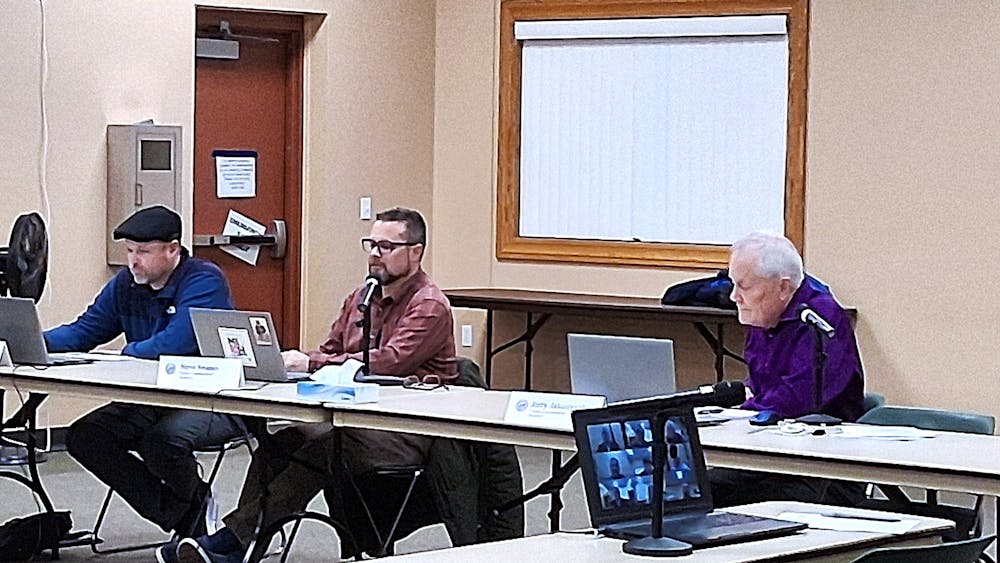Board of Commissioners forms committee to tackle opioid addiction

Commissioners (left to right) Steven Webber, Steve Swaney and Jerry Jaloszynski at the November 18, 2025, Board of Commissioners meeting discussing new members for the Opioid Advisory Committee
The Isabella County Board of Commissioners addressed drug control measures through the opioid committee, the adult drug court and the juvenile drug court at their Nov. 18, 2025, meeting. The board also addressed moving the register of deeds records to a safer location.
Opioid Committee
Isabella County has been working to establish the Opioid Advisory Committee to help combat opioid addiction in the county. The board made four appointments to add people to the committee:
- Isabella County Tribal Community Coordinator and Certified Peer Recovery Coach, Anna Winters
- Four years and two months in sobriety, Rose Jackson
- Director of Counseling and Wellness Services at Mid-Michigan College, Amy Campbell
- Lived experiences with opioid substance abuse, Jeremy Bennett
The committee will now have 11 members, which is more than the 10 people needed to call their first meeting, Jerry Jaloszynski, District 3 representative on the Board of Commissioners, said. The county still needs two more people for the committee, including someone from the Saginaw Chippewa Indian Tribe.
He said the first meeting will establish the committee’s hours, sub-committees, grant forms and the election of officers. The committee will work to establish itself this year and to hopefully get people applying for grants at the beginning of 2026.
“I am anxious to get this going because we have our first dollars that will be available (that) exceed $70,000,” Jaloszynski said.
People and organizations will be able to request grants from the committee to be used to directly help or educate people about opioid addiction in Isabella County.
These grants come from subsidies after a lawsuit against opioid manufacturers was filed by the state. The Opioid Advisory Committee has been getting money from settlements after the lawsuits, which has been put in a secured fund where interest will help create grants.
Public Records
The board also moved forward with moving public records for the register of deeds to U.S. Archives Inc., a storage facility in Saginaw, with a five-vote majority and two-vote abstentions.
The public records are currently in a rental facility that leaves them in an unsafe environment, such as being susceptible to flooding, Steve Swaney, District 6 representative on the Board of Commissioners, said.
Moving the documents would allow for all the documents to be identified and obtainable when requested, Swaney said.
Once the register of deeds is moved into a permanent space, such as the administration building, it will have room to store the documents. This is a temporary solution, Tobin Hope, District 7 representative on the Board of Commissioners, said.
County Clerk Minde Lux said the records, except for mortgages, have already been scanned and do not have to be in controlled temperature environments. She said the board should ask more questions to look into these subjects since they could have saved some money.
“I feel like we just wasted $13,000 on the register of deeds storing her files,” Lux said.
Bob Campbell, District 2 representative on the Board of Commissioners, said that the new location would cost over $1,000 a month when they could instead utilize the old jail by moving the records there.
Grant Contracts
The board also approved grant contracts for the Swift and Sure Sanctions Program (SSSP) for $83,277, the Isabella County Adult DWI/Drug Court for $122,880 and the Juvenile Drug Court for $104,448.
The SSSP grant will cover about seven months of wages, and they have already had a 60% reduction in their grant allocation, Kerri Curtiss, Trail Court Administrator, said. SSSP is a program to reduce the likelihood of convicted criminals from reoffending, such as through frequent substance testing.
The Adult Drug Court grant will help cover wages, fringes, testing, graduation supplies and more to keep the program running, Curtis said. The court provides rehabilitation services and tools for substance abusers to change their lifestyles.
The Juvenile Drug Court grant will help the program to continue the program to fund salaries, Curtis said. The court provides drug testing, counseling and helps with school success. She said without the grant, the program would have been cut entirely or required the county to fund it entirely.



